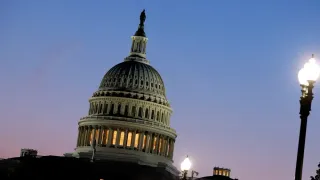December 27, 2023
Watch: Stephen Colbert Grills Andy Cohen, Anderson Cooper about NYE Drinking, Serves up Tequila
Kilian Melloy READ TIME: 2 MIN.
Will openly gay pals Andy Cohen and Anderson Cooper be getting wild once again this New Year's Eve despite CNN's prohibition against on-air drinking? To judge from their Dec. 21 appearance in The Late Show with Stephen Colbert – in which Colbert plied them with tequila shots – the answer is a resounding yes.
Colbert "dropped the 'big question on everyone's mind' as he asked Andy Cohen and Anderson Cooper, co-hosts of CNN's New Year's Eve special, whether they'd be drinking on the air this year," HuffPost reported.
Cooper played coy – "You'll just have to tune in to find out," he said – but Colbert, determined to get the party started early, served his guests "tequila shots 'just for the holidays'," HuffPost detailed.
The late night host followed up by "toss[ing] up a series of headlines about Cohen's recent plea on E! News for CNN to 'give the daddies some juice'," the article went on to add.
The cable network's kibosh on getting bombed during the annual special followed the 2021 New Year's Eve program welcoming in 2022, in which, as previously reported, Cohen unleashed a drunken tirade that targeted Bill DeBlasio – at the time, the outgoing mayor of New York City – as well as Ryan Seacrest, who was hosting ABC's New Year's Eve show.
According to Variety, CNN chairman Chris Licht issued a directive after the broadcast for the network's on-camera personnel to refrain from drinking on air, with the exception of Cooper.
"Licht told employees he felt on-camera drinking eroded the credibility of CNN personnel and damaged the 'respectability' they may enjoy among viewers," the publication detailed.
Not that the prohibition on drinking necessarily made any difference.
"Cooper admitted to Colbert that sober Andy was not 'any less embarrassing' last year" – the first time the broadcast was made under the no drinking directive – "than he'd been during prior New Year's Eve specials," HuffPost relayed.
Not that Cohen hadn't let it be known well in advance that he had no intention of acting less uninhibitedly than he had before, the sobriety rule notwithstanding.
"It's fun for me because I'm a guest on CNN, so I'm like a visitor," Cohen told Rolling Stone prior to last year's broadcast, adding: "And so I can kind of torch the place while I'm there, and then head out."
Among Cohen's antics last time: "He asked wildly inappropriate questions, we had on Nick Cannon and I think he suggested that Nick get a vasectomy," Cooper related to Colbert.
Unapologetic to the end, Cohen responded to that with, "I say what everyone else is thinking," HuffPost relayed.
Watch Cohen, Cooper, and Colbert yuk it up in the video below.






